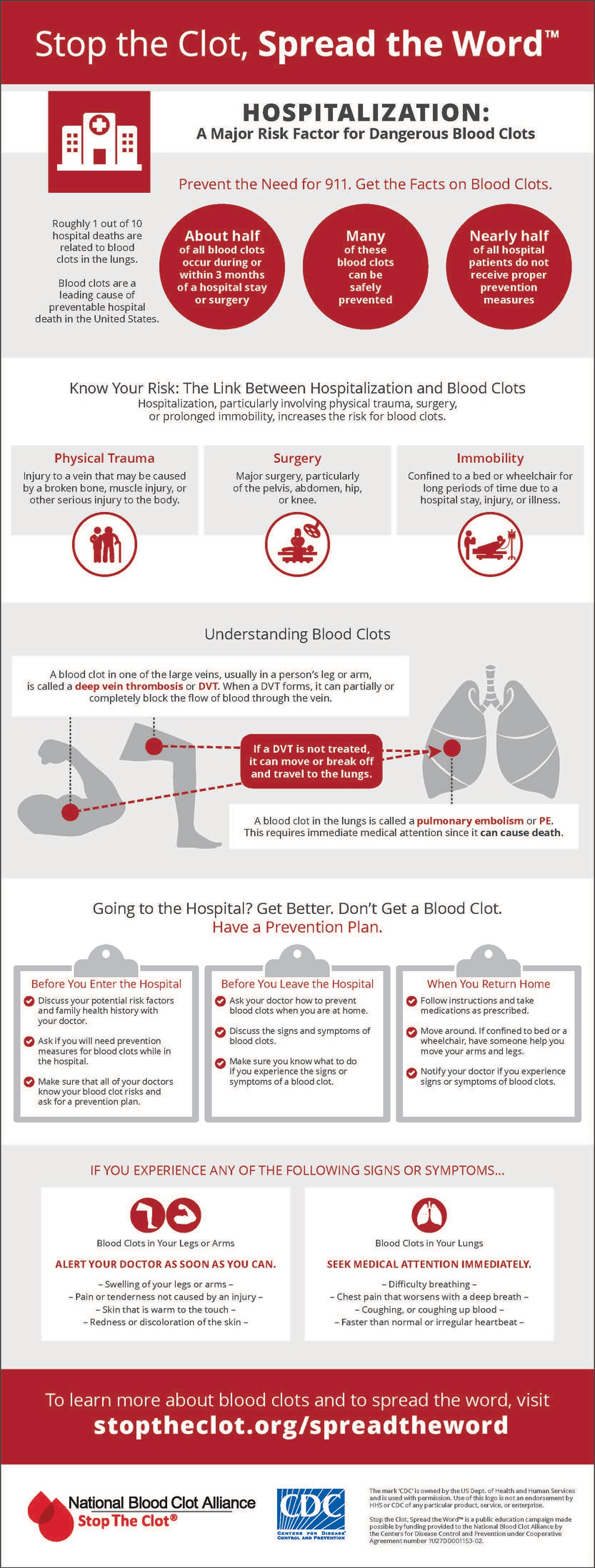Hip replacement and knee replacement are both known to have risks for blood clots or that can range up to 25 after surgery if patients are not treated to prevent them. This is a serious condition that can occur when a blood clot forms in a vein inside the.
 Hospitalization And Blood Clots Cdc
Hospitalization And Blood Clots Cdc
Deep vein thrombosis is common after a joint replacement surgery.
/blood-clot-causes-5b2277028e1b6e0036cbf0ca.png)
Risk of blood clots after surgery. Hospitalized patients often are warned of the possibility of venous thromboembolism VTE. For patients needing surgery for a broken ankle one of the biggest risks is a complication called deep vein thrombosis DVT. Blood clots may form as a result of the bodys natural defense mechanism to stop excessive bleeding.
Platelets in the blood rush to the site of. According to the National Blood Clot Alliance in the US it is estimated that even with preventative treatment 3 of patients who undergo orthopaedic surgery usually the reconstruction of joints will develop DVT and 15 will develop pulmonary embolism PE. It commonly occurs in the thigh or calf.
Causes of Blood Clots. People who have surgery on the legs and hip are especially at risk. The pumping action to the heart is decreased when blood clots block the flow of blood.
One of the risks that most surgeons advise their patients about following a hip or knee replacement operation is the possibility of a blood clot. As you can see the highest risk of a blood clot in the lungs is after hip or knee surgery. Blood clots deep venous thromboses or DVTs are a known risk of any surgical procedure including the Roux-en-Y Gastric Bypass RGB.
When a patient is not walking and moving his legs his heart may not get the proper amount of blood flow. At seven to 12 weeks after surgery the risk of blood clots was six times higher for the day case surgery group compared to the no-surgery group and 20 times higher for the inpatient surgery group. In DVT blood clots are formed in.
People over 40 years of age are at a higher risk of blood clots after surgery. The greatest risk associated with a DVT is that it could migrate to the lungs causing a pulmonary embolus PE which can be fatal. A pulmonary embolism is a blood clot that breaks free and travels through the veins.
Youre most likely to get a clot between 2 and 10 days after your surgery but your odds are higher for about 3 months. Lower extremity surgery often forces patients to stay off of their feet for a few weeks and be less active than usual. One type of clot youre at increased risk for is a condition called deep vein thrombosis DVT.
Without prophylaxis preventive treatment up to 80 percent of orthopedic surgical patients will develop DVT and 10 to 20 percent will develop PE. Blood clot risk depends on risk factors - such as age weight length of surgeryThe risk is present until you are walking normally - about 5 - 7 daysFor higher risk people dividing the surgery and giving heparin after surgery reduces the riskDiscuss the risk with your surgeon. Tissues and bone injuries involved in orthopedic surgery release chemicals that significantly activate clotting factors in the blood.
Your risk for developing blood clots increases after surgery. You may have a. After surgery patients are at high risk for blood clots.
Outpatient surgery patients at risk for blood clots A study by the University of Michigan U-M Health System in Ann Arbor showed 1 in 84 highest-risk patients suffers a dangerous blood clot after surgery. Formation of blood clots is one such risk within the first week after the cosmetic procedure. After surgeries patients are not moving as well as prior to the surgery and clots can form.
DVT is widely recognized as a major risk factor facing patients who undergo total hip arthroplasty THA and total knee arthroplasty TKA. Deep vein thrombosis can develop after any major surgery. Below we take a closer look at why blood clots can develop after a joint replacement surgery and how the complication can be prevented.
Deep vein thrombosis DVT is the formation of a blood clot within a deep vein. DVT refers to the formation of blood. The risk is associated with the type of surgery the medications taken and the patients medical history.
While there is always some risk of blood clots developing after knee or hip replacement surgery and other joint surgeries mentioned above these dangerous conditions can mostly be prevented. Preventing Blood Clots After Orthopedic Ankle Surgery. In fact any surgery involving your bones carries a significant risk of blood clots.
